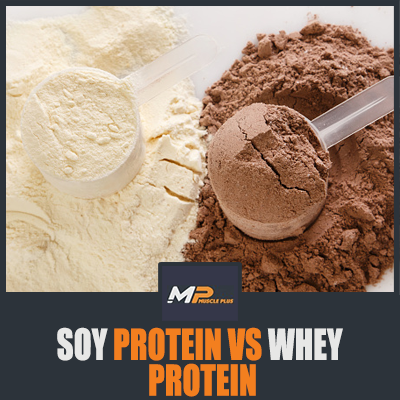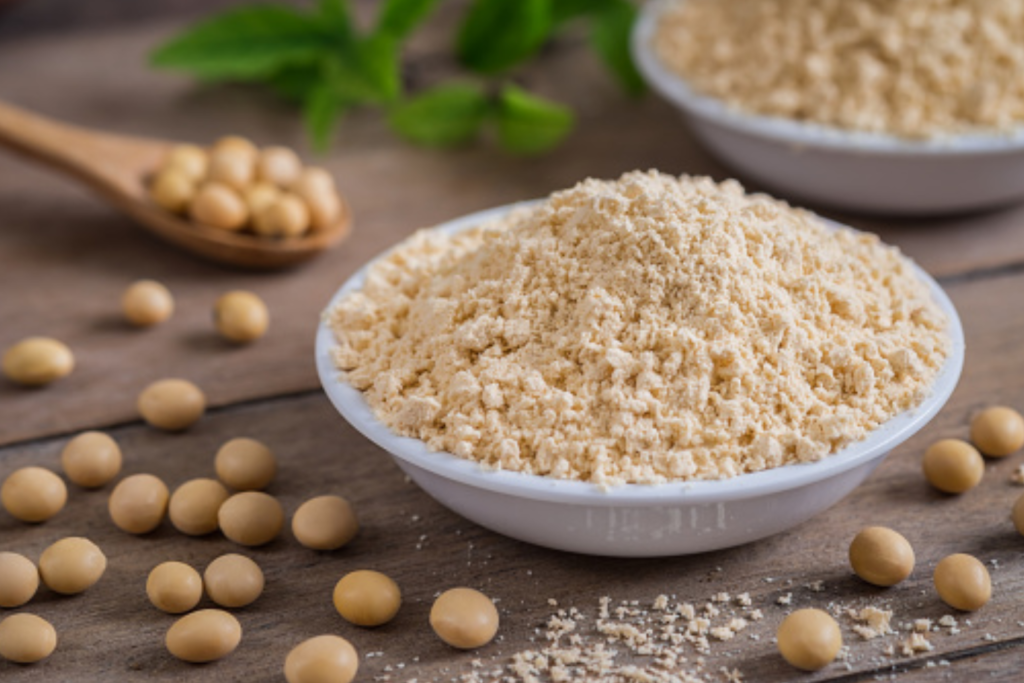Why does soy protein get a bad rap? Does soy protein affect fertility in males? Does whey protein make you fat?

It has been suggested to not use soy, soy contains phytoestrogens, the belief is that isoflavone can reduce testosterone hence reducing fertility in males. Whey protein can make you fat if you consume more than the recommended dose and you lead a sedentary lifestyle.
Let’s jump into the comparisons.
Can you build muscle with soy protein?
Yes. Soy protein has all of the essential amino acids that other protein powders may lack. As a result, Soy protein is a perfect choice for bodybuilders to pack on muscle mass.
Soy is so good it is suggested that soy protein alone is sufficient for muscle building. But, you should maintain a balanced diet for overall nutritional health.

Are soy protein shakes healthy?
Yes. If you are a vegetarian or vegan or carnivore, soy protein has some of everything you need to build muscle and remain healthy.
As a bonus soy protein reduces cholesterol levels (low-density lipoproteins) aka bad cholesterol. It also reduces triglycerides which will only help you in your quest for a healthy lifestyle.
Does soy ruin muscle gains?
Yes and no! If you are a bodybuilder who has been consuming an animal-based protein powder and has made significant gains in muscle mass you may find that when changing to soy proteins some of those gains will diminish.
Soy does have a lower biological factor when compared to some other protein shakes but it has upsides so the choice should be a balance between your needs and overall health.
How nutritious is soy protein?
The below table shows three variants of soy products: tofu, soy milk and soy protein powder.
In terms of protein, it shapes up well to other commonly used proteins for bodybuilding.
| Firm calcium-set tofu,1/2 cup (126 grams) | Soy milk, 1 cup (240 mL) | Soy protein isolate powder, 1 ounce (28 grams) | |
| Calories | 181 | 100 | 95 |
| Protein | 22 grams | 6.5 grams | 25 grams |
| Total fat | 11 grams | 3.5 grams | 1 gram |
| Carbs | 3.5 grams | 12 grams | 0 grams |
| Fiber | 3 grams | 0.5 grams | 0 grams |
| Calcium | 66% of the Daily Value (DV) | 23% of the DV | 4% of the DV |
| Iron | 18% of the DV | 5% of the DV | 29% of the DV |
| Magnesium | 17% of the DV | 9% of the DV | 3% of the DV |
| Phosphorus | 19% of the DV | 8% of the DV | 18% of the DV |
| Potassium | 6% of the DV | 6% of the DV | less than 1% of the DV |
| Zinc | 18% of the DV | 5% of the DV | 9% of the DV |
Does soy protein make you gain weight?
No, calories make you gain weight. If you use Soy as a part of a calorie-controlled diet then you will not gain weight.
The mechanics of weight gain are simple, too many calories intake and not enough calories being expended equals weight gain.
Soy or any other protein will not make you gain or lose weight if your calorie intake remains the same.
Is whey protein good for building muscle?
Yes. Whey protein is very effective at building muscles and has a high bioavailability due to its complete amino acids.
If taken regularly whey protein can show marked results in muscle mass gains after about 12 weeks of use.
How much whey protein should I take daily to build muscle?
10 to 20 grams. If you are looking for muscle gain and muscle definition then take whey at no more than 20 grams per day, The name of the game is weight loss and building muscles to gain muscle definition.
Clearly, the quantity consumed will depend on the intensity and frequency of your workouts, if you need more you can take up to 48grams.
It should be noted that whey protein isn’t just for bodybuilders, it can be used by anyone and has some amazing benefits such as improving skin and hair quality, it helps wounds heal faster and could be considered for use after surgery to speed healing.
Should I take whey protein with milk or water?
It depends. If you want to have lean muscle then take whey protein with water, if you would like a few extra calories and enjoy the taste better with milk go for it.
Should I take whey protein on rest days?
Yes, it’s fine. Whey protein has many benefits so you can consume it on your rest days. If you have had a strenuous workout and feel sore then whey will help reduce the soreness and help with muscle building.
Protein shakes are a great and convenient way for you to consume all the protein you need daily to be healthy.
What happens if you take too much protein powder?
You get digestive issues. If you take too much protein powder you will inevitably end up with some digestive issues that can include stomach cramps, bloating and gas. Whey protein could develop into diarrhoea symptoms as the lactose takes effect.
Is it OK to drink 3 protein shakes a day?
Yes. There are no hard and fast rules about how many protein shakes you consume in a day, it’s more common sense.
It is unlikely to cause any long-term effects if you consume too much protein powder apart from stomach cramps and gas.
Three a day can be considered to be in the realm of acceptable for the amount of protein in one day.
Which is better: whey protein or soy protein?
It’s a personal decision. If you look at the studies available then whey protein comes out on top as a clear winner every time in terms of gaining muscle mass.
A study showed that over a nine-month period the people who consumed whey protein gained a massive 83% extra muscle mass.
Based on this fact alone it is sensible to conclude that whey protein is the best protein to take if you are working out and want to gain muscle mass.

